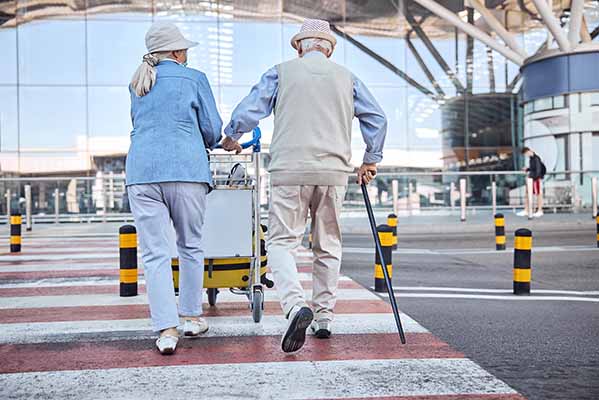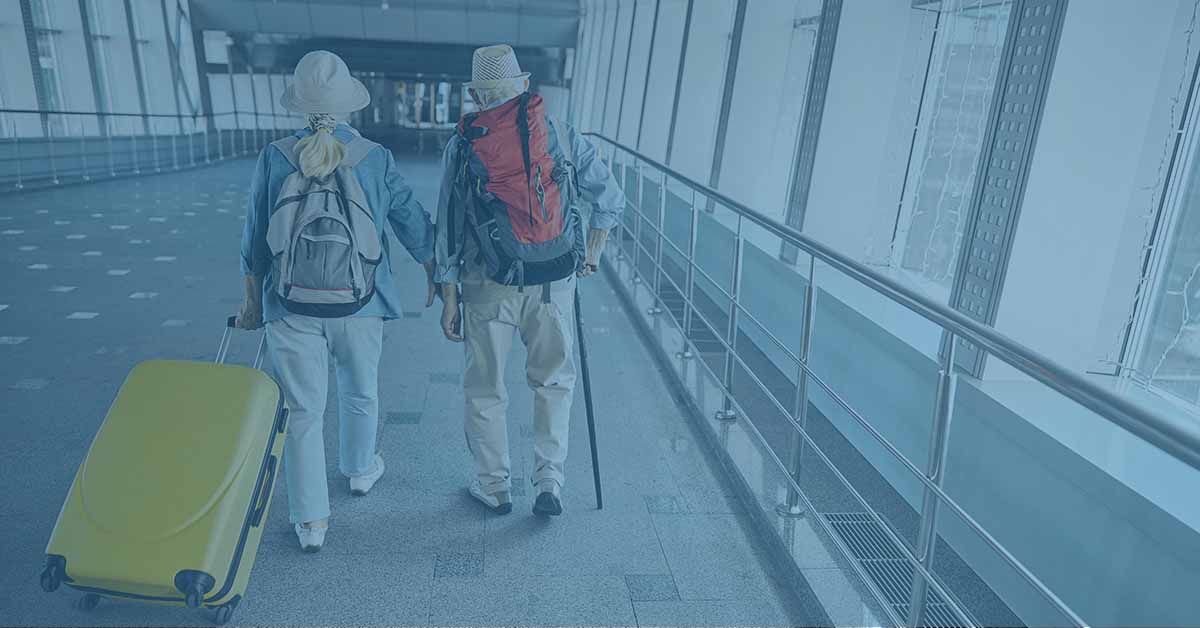12 Tips for Traveling With Elderly Parents (SAFE and Successful Travel)
In today’s world, traveling with the elderly can present challenges. What is the best way to ENJOY the adventure and excitement of travel while keeping your elderly loved ones SAFE?
As we age, our attitude towards exploring the world CHANGES. We still want to see the world.
But we prefer to travel at a leisurely pace and stay longer so we can fully explore new locations. We don’t need adventures, just a safe trip.
About 600 million international travelers were over 60 in 1999. Nearly one-third of holiday spending went to them.
According to the World Tourism Organization, this number will reach 2 billion trips annually by 2050.
When we plan a trip with our parents, we should keep these things in mind.
1. Make It a Priority To Speak With The Doctor
Talk to your parent’s doctor in advance about the conditions and restrictions you may need to be aware of.
Their doctor can also give advice on travel habits. Pay attention to diet, MEDICATIONS, and other vital suggestions for your trip.
Talking to your doctor before traveling is essential if you plan an international trip with elderly family members.
Traveling to some parts of the world may require vaccinations. The doctor has the background and expertise to know if they are safe for the patient.
They can also advise on what is or is not safe depending on your family member’s health.
2. Go Over All Medications and Plan for the Unexpected
While speaking with the doctor, it’s also a great idea to go over your loved one’s medication list.
Some medications may have unique requirements like refrigerated storage. Some may only be taken before or after meals.
Now is an excellent time to develop a plan if the drug is lost or unusable.
It’s best to always carry on medications in hand luggage to reduce the chance of being lost in a checked bag.
3. How to Travel with a Cane or a Walker on an Airplane
Are you wondering how to travel with a cane?
If your travel companion needs a walking cane for mobility assistance, they can take it on the airplane. TSA has special procedures for people who use assistive devices.
Foldable travel canes are a great option. The canes fold up small and are light. They fit easily into the overhead compartment of the plane.
Consider canes with LED lights as well. The light is there in case your travel companion needs to get up during the night.
Another option when traveling with a cane is to get one that folds and has a seat.
Your walker can either be checked as baggage or carried on board as carry-on luggage. But, there are some restrictions on the storage of your walker while traveling. You can read more about traveling with a walker on an airplane here.

4. Pre-Plan for Special Services
Will your parent or loved one need special assistance for walking long distances? Even airport corridors can be too long (they can be really STRESSFUL).
Maybe they need help with climbing a long flight of stairs? Taking the time to go over all accommodations and logistics will help avoid unexpected trouble with the trip.
Most businesses, including airports, can provide wheelchairs or transport chairs for travelers requiring extra assistance.
Getting through the airport and onto the airplane might be difficult with a wheelchair. If you’re new to using a wheelchair in the airport, you might wonder how much to tip an airport wheelchair attendant. Read on for a brief guide.
Note that there might be a reservation process or a prior sign-up to receive these services. A best practice is always to check ahead of time for any requirements.
5. Build Extra Time Into the Itinerary
Traveling with seniors is often SLOWER than many younger adults are used to moving.
As we age, the body doesn’t move as quickly as when younger.
Permitting extra time to travel will help things go much smoother for you both, allowing for complete enjoyment of the experience.
6. Senior Sports Events for Active Seniors
Is your travel companion in such good shape that he or she still wants to compete in old age?
Senior sporting events are an opportunity to travel and meet with the family.
Many people attend senior sporting events for the social experience. They meet new friends while exploring a new city.
Sporting events for seniors always have a great atmosphere and are a great way to stay active.

7. It May Be Best to Forgo That Window Seat
Almost everyone enjoys the vantage point when gazing out an airplane window. But these seats can be hazardous for seniors.
Airlines are placing seats closer and closer together. You need a near gymnastic level of flexibility to reach the window seat.
Instead, consider choosing an AISLE seat.
Aisle seating is especially helpful for mobility issues or traveling in a wheelchair. The easy accessibility and lifting armrest make it easier to sit down and stand up.
8. Choose Your Hotel Wisely
Everyone will need to rest comfortably to enjoy their travel experience.
When considering hotel accommodation, check the location carefully. See all available options to ensure the area is suitable for your trip.
If stairs are an issue, it may be best to request a first-floor room.
Or book at a hotel with more than one elevator. In case of an elevator failure, that will reduce the need to climb multiple stairs.
Choosing a room near an elevator may also be helpful. A room near the elevator will save your loved one the trouble of walking down long hallways and possibly getting LOST.
9. Talk About Money Matters While Planning the Trip
Agree on who will pay what expenses when planning a trip. This eliminates misunderstandings and potentially offended emotions later on.
Don’t assume that elderly parents or loved ones can pay for everyone’s dinner; this may not be the case.
In advance, review some of the standard travel fees and realistic costs. Their last trip may have been a long time ago. Their understanding of trip costs may be outdated.
10. Don’t Forget to Move on Flight
Sitting in one location for an extended period is not a good idea.
Stretch frequently. Stand up and stretch your legs.
That can help prevent vascular issues in the legs. Sitting too long can cause conditions like deep vein thrombosis (DVT) that raise the risk level for stroke.
Walking a little, or even standing up if walking is not possible, can substantially lower DVT risks. And help keep the lower body muscles loose, avoiding pain and stiffness.
11. Plan for Food Options in Advance
As we age, changes occur within our digestive system making it more sensitive to certain foods.
This safety tip is critical if your travels take you out of the United States.
Unfamiliar foods, spices, and preparation methods can spell trouble for an unsuspecting stomach.
Knowing any dietary restrictions when selecting meals and snacks while traveling is essential.
Your loved one’s doctor should be able to assist in letting you know about popular foods to avoid at your destination.
12. Don’t Announce Your Trip to the World
It’s a great idea to let family and a few close friends know your trip details.
But announcing to the world that you will be away from home is just not a wise thing to do (this is a big NO-NO!).
We all live in the age of information. It is unbelievably easy for someone to get your private information and visit your home when they know the house will be empty.
The Bottom Line
Traveling with an elderly family member is a beautiful way to make memories to cherish for a lifetime.
The trip should be close to perfect, with some planning and groundwork beforehand.
If you are traveling in the winter, we all know how difficult it can be to stay warm, especially if you use a wheelchair. Here are some tips on how to keep warm in a wheelchair.
Resources
Tips for traveling with a cane or walker:
https://seniorsupported.com/travelling-by-plane-with-cane/
https://seniorsupported.com/can-you-take-a-walker-on-a-plane/
Sports Events for People Over 50: Competition and Fun (and Olympics!):
https://seniorsupported.com/senior-sport-events/
How to prepare for your pre-travel appointment:
https://wwwnc.cdc.gov/travel/page/preparing-for-appointment
How do disabled passengers request wheelchair assistance at airports and on airlines:
https://wheelchairtravel.org/air-travel/airline-special-assistance-request-contacts/
COVID-19 travel advice:
DVT (deep vein thrombosis) advice:
https://www.nhs.uk/live-well/healthy-body/prevent-dvt-when-you-travel/
Travelers’ diarrhea: What you need to know:
https://www.webmd.com/digestive-disorders/features/travelers-diarrhea-what-you-need-to-know
Walking aids for the elderly – 10 different types of mobility devices:



